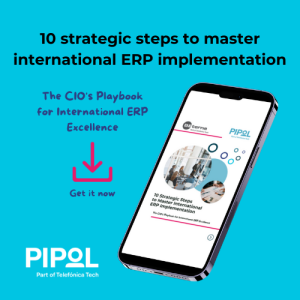Culture is (still) the main reason why ERP projects fail

On paper, the ERP project plan may seem perfect. Objectives are set. Preparations are made. Research has been conducted. The technology chosen is future-proof. The team is assembled. Planning is done. Key deliverables are clear. Everything is well-designed. Ready, set, go.
However, as things progress, it turns out that deadlines are missed, things don’t work, and the team’s high spirit evaporates.
What went wrong? In the 50s, management guru Peter Drucker stated that ‘culture eats strategy for breakfast’. This is still the case – and the reason why many large projects fail. When we at Pipol engage in ERP projects, we very often see that preparations on culture and communication are entirely lacking. Thus, a small organization in a large, global enterprise can easily derail an entire, international ERP project.
What are the main challenges?
Based on our experience, the main challenges centers around the human element in transformations, culture, and communication. More specifically, there may be:
- Lack of buy-in from the receiving organization
- Lack of user involvement in the process
- Lack of local cultural understanding
- Insufficient user training
- No follow-up of performance after go-live
- No incentives for users to make an effort
- Lack of communication plan at a corporate and local level
Are employees per se resistant to changes and unwilling to do what the strategy dictates? No, not at all. If employees don’t understand the changes, don’t get motivated by changes, or don’t agree with changes, it may be an expression of lack of readiness.
What can be done?
International ERP implementation is not risk-free, so it’s very important to map the change management processes required before you kickstart the implementation. In order to do this properly, you need to constantly align the strategic goals of the ERP project with each local organization. You must make sure that all the local partners in all the local countries are well prepared and timely aligned with your goals.
At Pipol, we involve an International Engagement Manager in each project to ensure that the strategy is communicated to the local deployment partners as well as to all team members. It’s important that everyone understands and abides to the organization’s strategy. And if there are specific organizational, cultural, or behavioral challenges to be solved, they will be spotted immediately, and the necessary change management processes can be kickstarted.
In reality, many challenges can be solved with good communication and dialogue with users before kickoff. Therefore, International Engagement Managers should be invited on board any international ERP project from the very beginning as well as be part of the Steering Committee as representative for the project.
Each organization is unique, and so is each project. But implementing transformational technology cannot be done in a successful way without involving and communicating with those who are subject to the transformation.
Download our ebook “5 Steps Guide to International ERP” and learn more about the steps to having a successful International ERP solution.





